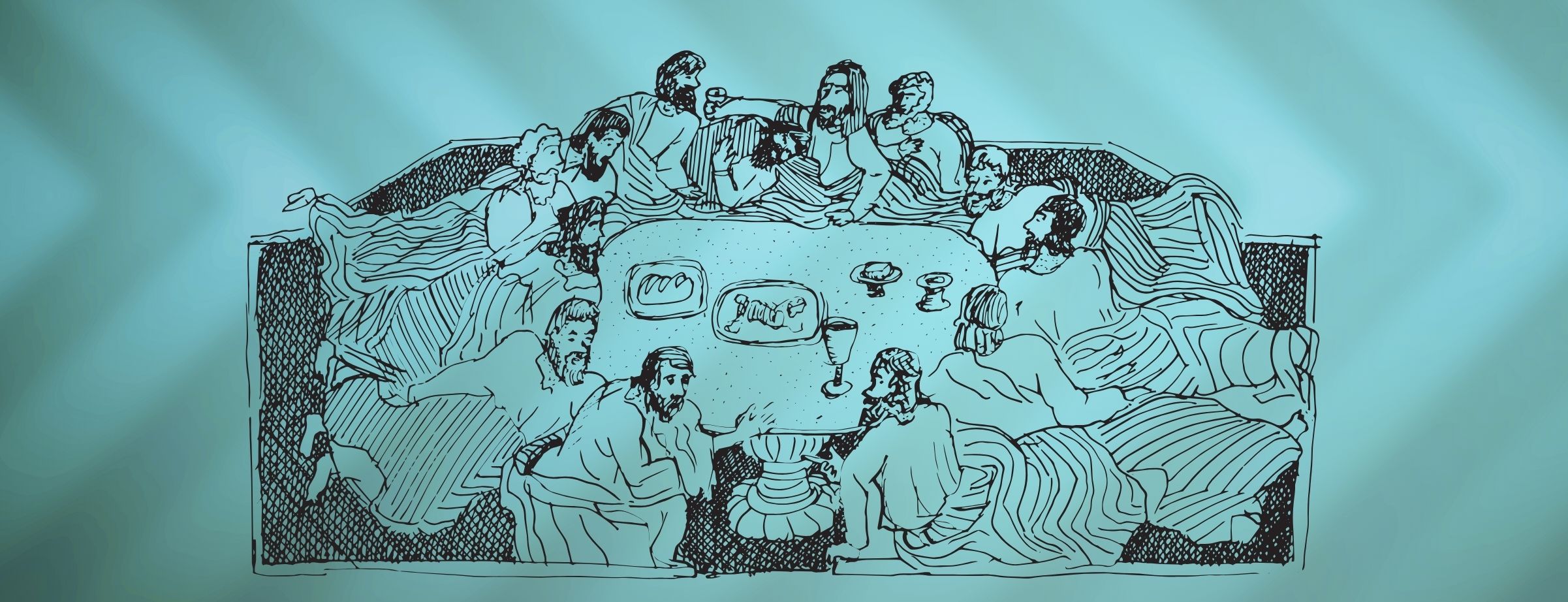If we knew it was the last evening of our lives, would we still be leading? If we knew betrayal and desertion were among the ranks of those we love, would we lead well to the very end and finish strong? Servant leadership is finishing well on the last evening of our lives. Servant leadership is for the courageous, not the faint-hearted. Servant leaders are die-hard initiators, not reactionaries. Servant leadership requires the strongest, not the weakest of leaders. Servant leaders are audacious leaders who serve, not servicers who lead. Jesus was the most confident, deliberate, and sacrificial leader on the last evening of his life. He produced the men who led the movements in Acts.
It was the last evening of Jesus’ life on earth in Luke 22 (the same event as John 13). He wanted to spend his last hours with his twelve dearest friends. They were his brothers, ‘those who have stood by me in my trials’ (Luke 22:28). He was eager to have this final meal with them (v.15). That evening as he dined with his closest friends, he poured out his heart—that he was troubled in spirit (John 13:21). He divulged his inner struggles—that he was going to be betrayed, suffer, die, and that this was his last meal with them (Luke 22:15-16, 22). Jesus was at his most vulnerable. But instead of grieving, his closest friends began arguing about who was the greatest (Luke 22:24). Instead of empathizing and understanding, they pushed their own agendas and ambition.
Here are six characteristics drawn from the events of the last evening of Jesus’ life to guide us on what kind of servant leaders we should be till the very end.

1. Servant leaders serve not just the friends they most expect to care, understand and empathize with them, but also those who don’t—or even let them down
Servant leaders serve those who seemingly advance themselves instead of having their backs. Jesus pointedly corrected his friends, ’The kings of the Gentiles lord it over them; and those who exercise authority over them call themselves Benefactors. But you are not to be like that. Instead, the greatest among you should be like the youngest, and the one who rules like the one who serves. . . . I am among you as one who serves’ (Luke 22:25-27).
We know that our authority is not limited to our weak bodies, wounded selves, or disadvantaged pasts. Instead, we have full authority in Christ
In Palestine in Jesus’ time, people walked in sandals on dusty desert roads. Their feet were coated with dirt in good weather and mud in bad weather. When they arrived at a host’s home, a slave usually stood by the door with a jug and towel, ready to wash the guests’ feet. But that evening, there was no slave there. The disciples who personally served Jesus should have washed his feet—but no one did. When the meal was underway, Jesus did what none of them were willing to do. Perhaps he did it because the disciples started arguing about who was the greatest (Luke 22:24).
2. Servant leaders must genuinely love the people they lead from the heart
It’s much easier to serve out of duty. But our serving must express genuine care and love for people.
Jesus simply loved them. When he knelt to wash their feet, he was not teaching an object lesson on service. He genuinely loved them: ‘ . . . having loved his own who were in the world, he now showed them the full extent of His love’ (John 13.1). Washing the disciples’ feet was to lavish the full extent of His love.
Jesus was able to condescend to a slave’s task because He knew he descended from God and was ascending to God. He was secure in His identity and authority: ‘Jesus knew that the Father had put all things under his power, and that he had come from God and was returning to God’ (John 13:3). He knew that before he ascended, his God-given assignment was to suffer and redeem mankind. Jesus knew both his assignment and the authority he had to accomplish it.
3. Servant leaders know their identity, assignment, and authority in Christ
We don’t just come from our broken earthly backgrounds and history. Instead, we know that we come as children of God and co-heirs with Christ. We know that in our life journey we are going to the Father. We know that our authority is not limited to our weak bodies, wounded selves, or disadvantaged pasts. Instead, we have full authority in Christ because we are seated with Christ, above all other authorities (Eph 1:20-21).
Jesus also knew his season and timing. He had to finish his assignment and knew that his time was ending: ‘Jesus knew that the hour had come for him to leave this world and go to the Father’ (John 13:1).
4. Servant leaders know the timing and seasons of their lives
Servant leaders do not overstay their leadership. They know that their leadership appointment is from Jesus but they also know when the season is closing, so that they can lead and finish well to the very end.
At mealtimes, the Jews reclined at a U-shaped table with the host seated in the middle. They would rest on their left elbows and eat with their right hands, with their heads resting on the chest of the person on the left. John, the beloved disciple, was on Jesus’ right leaning on Jesus’ chest (John 13:23). Peter was likely to the right of John to be within earshot (John 13:24). Usually, a host reserved the seat to his left as the highest honor for his dearest friend. Who was in this seat? It was Judas because it was clear that Jesus talked and gave bread to him privately. Jesus bestowed Judas with the seat of highest honor and closest friendship. That night, while John’s head nestled in Jesus’ chest, Jesus’ head rested on Judas’ chest.
But while Jesus rested his head on Judas, he knew the cruel betrayal that Judas was scheming that evening. In John 13:18, he quotes Ps 41:9: ‘Even my close friend, whom I trusted, he who shared my bread has lifted up his heel against me.’ In Hebrew, the phrase describes brutal violence. Jesus shared bread with a dear friend whom he knew was about to brutally betray him (John 13:21).
As the meal with his friends drew to an end, Jesus told Judas to quickly go do what he was about to do (John 13:27). Even till the very end, Jesus showed Judas deep affection by dipping and giving bread to him. In that culture, a host personally offering a morsel from a bowl symbolized special friendship; for example, when Boaz displayed his love by giving Ruth bread dipped in wine (Ruth 2:14). Jesus showed Judas a special sign of love, as if saying, ‘I know what you are doing but I love you to the end.’

5. Servant leaders love and serve those who betray and harm them
Do we have ‘enemies’ that we need to forgive again and again so that we may love them appropriately?That night, Jesus washed the feet of his closest friends who vied for position, and the feet of Judas who betrayed him. He also washed the feet of one of his closest friends, Simon Peter, who swore he was going to lay down his life for Jesus (John 13:37). Instead, Peter denied and deserted him that night. The difference between Judas and Peter was that Judas systematically plotted to kill Jesus. For Peter, it was a moment of weakness. Jesus knew Peter’s weaknesses, but he could see Peter’s love for him and his potential to become a courageous leader. Jesus said, ‘I have prayed for you, Simon, that your faith may not fail. And when you have turned back, strengthen your brothers’ (Luke 22:31-32). Peter went on to become the key leader of the earliest church in Acts (Acts 1:15).
Do we have ‘enemies’ that we need to forgive again and again so that we may love them appropriately?
6. Servant leaders pray for and have Jesus’ eyes to see the divine potential of those who have disappointed, denied, and deserted them
Jesus invites us to lead and serve as he did on that last evening of his life. He calls us to not only serve those who love us, but also those who advance their own agendas, who disappoint, deny, and desert us, and who betray and harm us. He said, ‘Now that I, your Lord and Teacher, have washed your feet, you also should wash one another’s feet. I have set you an example that you should do as I have done for you’ (John 13:13-15). He does not call us to only love others as we love ourselves. No. He calls us to love others as he loves them: ‘A new command I give you: Love one another. As I have loved you, so you must love one another. By this all men will know that you are my disciples, if you love one another’ (John 13:34).
The last evening of Jesus’ life was the hardest, most painful evening. Yet he made a new covenant and instituted the Lord’s supper with those who failed him, those who would become the servant leaders in Acts (Luke 22:17-21). The call to lead like Jesus to the very end comes with a promise, ‘Now that you know these things, you will be blessed if you do them’ (John 13:17). May we be greatly blessed as we lead and finish well to the last evening of our lives.

